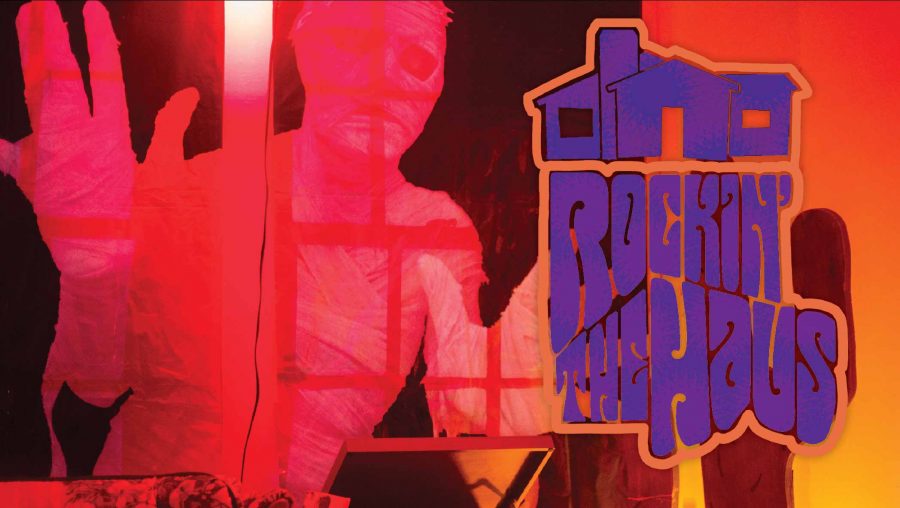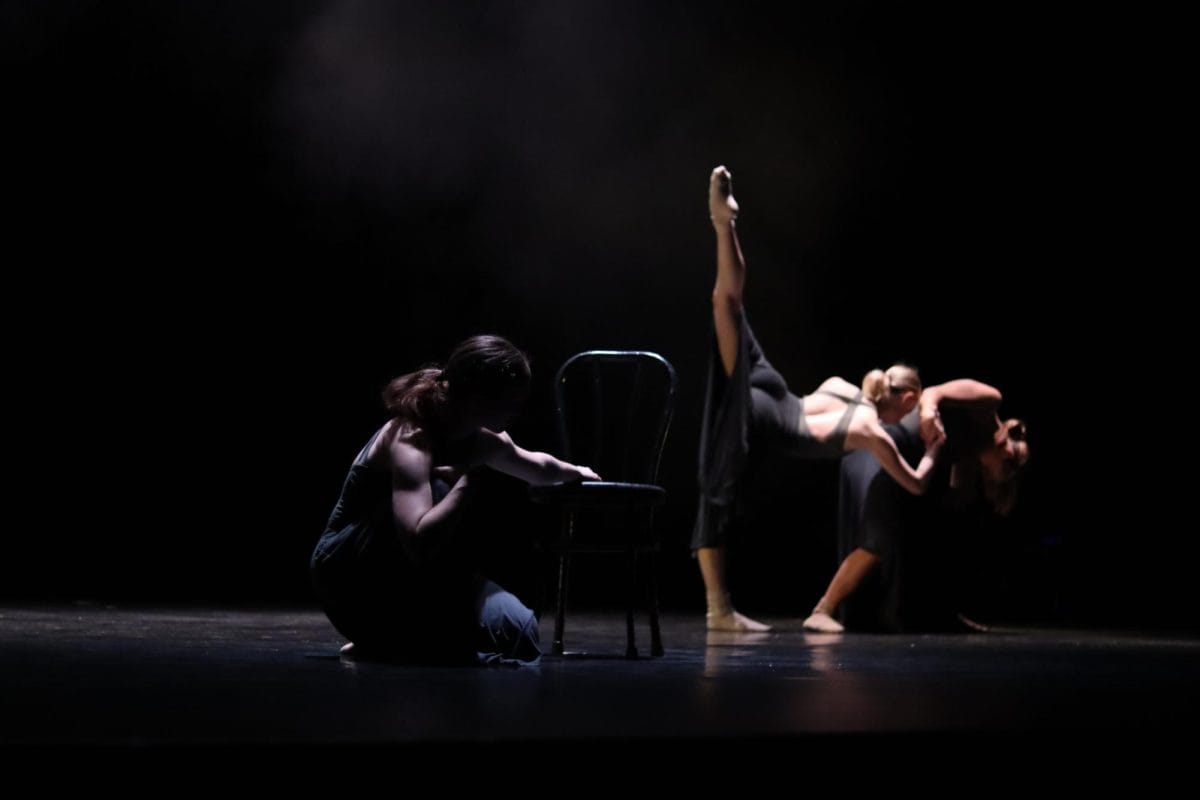By day, it’s just another house. But one night a month, Baby Haus transforms from a typical residence to a music venue, where anything goes and nothing is outside the realm of possibility.
Baby Haus, which will hold its fourth birthday celebration this Saturday, emerged in 2010 as the brainchild of local musician and Green Bar talent booker David Allen. Allen initially attended the University of Montevallo and studied abroad in Brazil before relocating to Tuscaloosa and graduating from The University of Alabama in 2012.
“The whole goal with moving to Tuscaloosa was specifically to start a music scene here,” Allen said. “There’s a certain kind of endearing desperation to a lot of people in Tuscaloosa. People are much more ready and susceptible for a scene here, like they really wanna make it happen. So it seemed like a natural fit.”
Allen started out sharing a one-bedroom apartment with anywhere from four to six roommates, all between the ages of 17 and 22. The group used to hold shows near a set of railroad tracks. Eventually, Allen moved out of the apartment and into a house, and the shows followed him there.
“The first people we were able to find to hang out with us were a couple of women in their late 20s who were studying book arts,” Allen said. “One of them kept calling us the ‘Baby Punks,’ and she started calling it ‘Baby Haus,’ and then it really stuck.”
With Baby Haus, Allen said he sought to create a world that obliterated all preconceived ideas and expectations, a world where rules and social norms didn’t exist.
“In Baby Haus, the explicit goal from day one was to come up with a place where everything can be its own precedent and there was never any inclination for how a room or the environment needed to be used,” Allen said. “It was very literally trying to make everything new all the time. If you look at the event posts and messages we would send out, we tried to make it sound like this place outside of reality where everything was permissible.”
In its glory days, Baby Haus walked a thin line between breaking rules and breaking, well, everything else. Graffiti, public fornication and destruction of property were all commonplace in the venue’s early years.
“Shows at Baby Haus aren’t just shows,” said Nicola Walls, a junior majoring in English and Allen’s friend. “There aren’t rules at Baby Haus, or at least there weren’t rules. It really was a place where you could just do whatever you wanted, but the people there kept it from descending into absolute chaos.”
From one show to the next, Baby Haus never stayed exactly OVERSET FOLLOWS:the same.
“The house was different every time,” Allen said. “Nothing was a bedroom; nothing was a living room. It was always changing. We had a lot of elaborate props, and the kids were just kind of nuts. And after they’d been shown that they didn’t have to respect formal rules of interaction in Baby Haus, they just kind of took to it, and it became the norm there.”
Despite this lack of structure, Walls said Allen always managed to keep the crowd from getting too out of control.
“There was a sense of professionalism at Baby Haus that I’ve never seen at another house venue,” Walls said. “David Allen knew how to keep things under wraps and still let everyone have a fun time. It could be a scary place to the unwitting onlooker, but there was never any real danger there.”
However, a world without rules can become pretty exhausting, so Allen eventually moved on. Not only did he physically move into another home, but he also changed the way Baby Haus operates. The anything-goes policy still exists, but to a lesser extent.
“It’s really hard to live like that,” Allen said. “People just absolutely destroy your house every time – it’s dirty, anything could happen at a party. These days it’s more of a venue rather than an art project. In those days, it was a social experiment. Now, it’s a thing that I can do and still stay sane.”
“Since Baby Haus is kind of, these days, for me, I think about what bands I wanna see, and I book them,” Allen said. “Often Baby Haus involves booking a lot of bands that otherwise people might really dislike … But really just bands that I love and want to see live.”
These days, Baby Haus shows attract anywhere from 10 to 60 people, and Allen said he’s expecting as many as 80 to show up for Saturday night’s show. The exciting, unpredictable nature of Baby Haus attendees, and of house shows in general, attracts many different musicians, he said.
“A lot of people want to play house shows because they’re more fun,” Allen said. “I don’t think I’m exaggerating when I say [Baby Haus] is famously very fun. There’s a lot of venues in Birmingham where the audiences don’t dance, but at Baby Haus, people go nuts. Especially back in the day, it would almost be too much to handle. But still these days, you might have 15 people in the crowd, but folks are still trying to crowd surf.”
Baby Haus used to host as many as three shows per week, but now that number is closer to once a month. Allen said Baby Haus has brought different acts to Tuscaloosa that might not have come here otherwise. Some such artists include noise musicians, who work specifically with sound composition by blending the categories of noise and music.
“If you’re talking about noise musicians, which is really where a lot of new things are happening these days, that almost only exists in house venues and DIY venues,” Allen said. “You’ll never go to a bar and see a noise act. So in some ways, house venues are the only outlet for a lot of very new kinds of music.”
Chris Seifert, a member of the band Dead Balloons, played his first Baby Haus show in 2010, and the band has been performing there sporadically ever since.
“Everytime we play at the Baby Haus, something different is going to happen,” Seifert said. “Somebody might flip off of our drummer’s kick drum. Somebody might climb on the roof. Somebody might just be asleep on the floor, and the band is right in the middle of it. There is no divide besides the drummer’s drums and the singer’s microphone stand.”
Seifert said although Baby Haus has evolved, it still has the same fundamental goal.
“The house is larger, the floor isn’t caving in, and things are a little less crazy,” Seifert said. “There’s less graffiti. But it’s still the same venue. It still has the same purpose – to promote live music.”
Baby Haus shows aren’t as destructive as they used to be, and Allen said he’s developed a system to minimize damage even further.
“I’ve got it down to a science by this point,” Allen said. “I take the blades off the fan before the show so they don’t get snapped, anything broken gets cleaned out, [I] put down some crappy carpets on top of the real carpets so they don’t get smothered in beer. I’ve got it pretty well handled. But people are usually pretty respectful.”
Baby Haus has always been all-ages, and Allen has never charged a cover charge, so no one would ever be excluded from attending the shows.
“I’ve lived in mostly small towns my whole life,” Allen said. “When you’re underage, there’s just nothing to do. All the shows are at bars, and you can’t get in, so you wind up hanging out in parking lots just wasting time. So it’s really important for me and for a lot of musicians to give people something to do.”
Allen said Baby Haus will hold its last show in May, but he expects house shows to continue to be a part of Tuscaloosa’s music scene.
“If you’re disappointed in the town you live in, it’s entirely within your responsibility and ability to change it,” Allen said. “If you feel like a scene is missing, it’s up to you to create one.”
Baby Haus will hold its fourth birthday party Saturday at 9 p.m.







